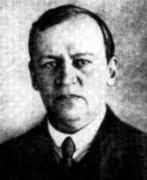Person: Luzin, Nikolai Nikolaevich

Nikolai Nikolaevich Luzin was a Russian mathematician who made important contributions to the foundations of mathematics, measure theory and topology. He was head of the "Luzitania" research group at Moscow.
Mathematical Profile (Excerpt):
- For Luzin this was torture.
- Fortunately the tutor was a talented young man who quickly discovered that, despite Luzin's poor performance in mathematics, he could solve hard problems but often using a novel method that the tutor had never seen before.
- Soon the tutor had shown Luzin that mathematics was not a subject where one had to learn long lists of facts, but a topic where creativity and imagination played a major role.
- There Luzin entered the Faculty of Physics and Mathematics at Moscow University intending to train to become an engineer.
- Luzin, together with a friend, moved into a room owned by the widow of a doctor.
- At Moscow University Luzin studied under Bugaev, learning from him the theory of functions which was to influence greatly the direction his research would eventually take.
- However, although Luzin appeared to lack talent in mathematics, one of his teachers Egorov spotted his great talent, invited him to his home, and began to set him hard problems.
- This had a major effect on Luzin, who was a close friend of Florensky, as we shall describe below.
- After graduating in the autumn of 1905 Luzin seemed unsure whether to devote himself to mathematics.
- Luzin was not only upset by seeing the prostitutes, he also says in the letter how he had been affected by the 'terrible days' of the 1905 Revolution.
- There are letters from Egorov at this time pleading with Luzin not to give up mathematics.
- After returning to Russia, Luzin studied medicine and theology as well as mathematics.
- His interest in mathematics slowly returned but it was not until 1909 that Luzin seems to have finally committed himself completely to mathematics.
- In 1910 Luzin travelled abroad visiting Göttingen where he was influenced by Edmund Landau.
- In 1917 Luzin was appointed as Professor of Pure Mathematics at Moscow University just before the Revolution.
- The Revolution caused Luzin to rethink some of the same thoughts as he had done at the time of his crisis and again he exchanged letters with Florensky.
- Over the next ten years Luzin and Egorov built up an impressive research group at the University of Moscow which the students called 'Luzitania'.
- Luzin's main contributions are in the area of foundations of mathematics and measure theory.
- From 1917 onwards, Luzin studied descriptive set theory.
- Much of Luzin's work on set theory involved the study of effective sets, that is sets which can be constructed without the axiom of choice.
- Luzin proceeded from the point of view of the French school (Borel, Lebesgue), which greatly influenced him.
- But whereas the French had analysed set-theoretical constructions carried out with the help of the Axiom of Choice, Luzin went considerably further and considered difficulties arising within the theory of effective sets.
- Luzin's school was at its peak during the years 1922 to 1926, but then Luzin concentrated on writing his second monograph on the theory of functions and spent less time with the young mathematicians in the school.
- In 1927 Luzin was elected as a member of the USSR Academy of Sciences.
- In 1931 Luzin himself turned to a new area when he began to study differential equations and their application to geometry and to control theory.
- up to 1938, when Luzin, by means of a subtle analysis of these equations, established that the existence of a principal base is rather rare.
- The aim was obviously to get rid of Luzin as a representative of the old pre-Soviet mathematical school of Moscow: his master, Egorov, had been himself the victim of such a campaign in 1930 (based on his religious sympathies) and died shortly after in 1931 in despair and misery.
- It shows that Luzin had had a narrow escape from a tragic fate as the Soviet authorities may have feared the international consequences of a too strong attack on a scientist so famous abroad.
- The main visible consequence of the Luzin affair was that, from this precise moment, Soviet mathematicians began to publish almost exclusively in Soviet journals and in Russian.
- Luzin always had an interest in the history of mathematics and late in his career he wrote important articles on Newton and on Euler.
Born 9 December 1883, Irkutsk, Russia. Died 25 February 1950, Moscow, USSR.
View full biography at MacTutor
Tags relevant for this person:
Analysis, Origin Russia
Thank you to the contributors under CC BY-SA 4.0! 

- Github:
-

- non-Github:
- @J-J-O'Connor
- @E-F-Robertson
References
Adapted from other CC BY-SA 4.0 Sources:
- O’Connor, John J; Robertson, Edmund F: MacTutor History of Mathematics Archive
